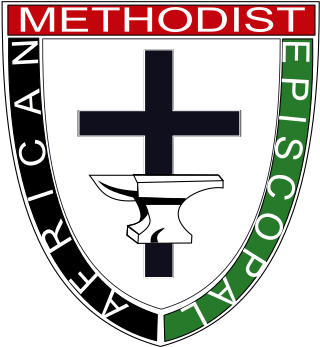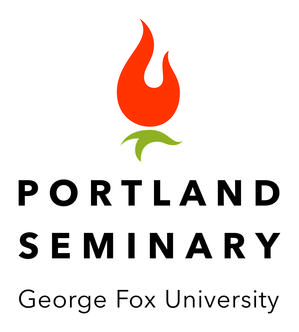Related Research Articles

The Christian Church (Disciples of Christ) is a mainline Protestant Christian denomination in the United States and Canada. The denomination started with the Restoration Movement during the Second Great Awakening, first existing during the 19th century as a loose association of churches working toward Christian unity. These slowly formed quasi-denominational structures through missionary societies, regional associations, and an international convention. In 1968, the Disciples of Christ officially adopted a denominational structure. At that time, a group of churches left in order to remain nondenominational.

The Free Methodist Church (FMC) is a Methodist Christian denomination within the holiness movement, based in the United States. It is evangelical in nature and is Wesleyan–Arminian in theology.
Methodism, also called the Methodist movement, is a Protestant Christian tradition whose origins, doctrine and practice derive from the life and teachings of John Wesley. George Whitefield and John's brother Charles Wesley were also significant early leaders in the movement. They were named Methodists for "the methodical way in which they carried out their Christian faith". Methodism originated as a revival movement within Anglicanism with roots in the Church of England in the 18th century and became a separate denomination after Wesley's death. The movement spread throughout the British Empire, the United States and beyond because of vigorous missionary work, and today has about 80 million adherents worldwide.

The Church of the Nazarene is a Christian denomination that emerged in North America from the 19th-century Wesleyan-Holiness movement within Methodism. It is headquartered in Lenexa, Kansas. With its members commonly referred to as Nazarenes, it is the largest denomination in the world aligned with the Wesleyan-Holiness movement and is a member of the World Methodist Council.
The Holiness movement is a Christian movement that emerged chiefly within 19th-century Methodism, and to a lesser extent influenced other traditions such as Quakerism, Anabaptism, and Restorationism. Churches aligned with the holiness movement teach that the life of a born again Christian should be free of sin. The movement is historically distinguished by its emphasis on the doctrine of a second work of grace, which is called entire sanctification or Christian perfection. The word Holiness refers specifically to this belief in entire sanctification as an instantaneous, definite second work of grace, in which original sin is cleansed, the heart is made perfect in love, and the believer is empowered to serve God. For the Holiness movement, "the term 'perfection' signifies completeness of Christian character; its freedom from all sin, and possession of all the graces of the Spirit, complete in kind." A number of Christian denominations, parachurch organizations, and movements emphasize those Holiness beliefs as central doctrine.

The African Methodist Episcopal Church, usually called the AME Church or AME, is a Methodist denomination based in the United States. It adheres to Wesleyan–Arminian theology and has a connexional polity. It cooperates with other Methodist bodies through the World Methodist Council and Wesleyan Holiness Connection.
Non-denominational Christianity consists of churches, and individual Christians, which typically distance themselves from the confessionalism or creedalism of other Christian communities by not formally aligning with a specific Christian denomination.

The Alliance World Fellowship is an evangelical Christian denomination It includes 6.2 million members throughout 88 countries within 22,000 churches.

Aiden Wilson Tozer was an American Christian pastor, author, magazine editor, and spiritual mentor. For his accomplishments, he received honorary doctorates from Wheaton and Houghton colleges.

Portland Seminary at George Fox University is a multi-denominational, university-based school that offers a variety of master's degree and postgraduate degree programs in theology and ministry, located in Portland, Oregon.
Thomas J. Bickerton is an American United Methodist bishop. Bickerton was raised in West Virginia and graduated from West Virginia Wesleyan College in 1980 with a Bachelor of Arts degree in Sociology and Psychology. Subsequently, he entered seminary at Duke University Divinity School, completing his Master of Divinity degree in 1983. While attending seminary he served as student pastor following his ordination in 1982 as Deacon. His first appointment out of seminary was to Perry Memorial United Methodist Church, in Shady Spring, West Virginia, in June 1983; he served in that location for six years. In 1985 he was ordained as an Elder by Bishop William Boyd Grove. In 1989, he was appointed to serve Forrest Burdette Memorial United Methodist Church in Hurricane, West Virginia, where he pastored for the ensuing nine years. While in ministry there he also earned his Doctor of Ministry degree at United Theological Seminary, Dayton, Ohio, completing it in 1994. In 1998, he became District Superintendent of his home area, the Northern District.

The cell group is a form of church organization that is used in many Christian churches. Cell groups are generally intended to teach the Bible and personalize Christian fellowship. They are always used in cell churches, but also occur in parachurch organizations and other interdenominational settings, where they are usually referred to as Bible study groups. In Methodism, they are known as class meetings and are a means of grace; in Catholicism, they are known as basic ecclesial communities.
Donald Henry Frere Gee was an English Pentecostal Bible Teacher. He wrote the book Wind and Flame, which is the story of Pentecostalism in Europe in the 20th century. He was called "The Apostle of Balance."
Pastoral care, or cure of souls, refers to emotional, social and spiritual support. The term is considered inclusive of distinctly religious and non-religious forms of support, including atheist and religious communities. It is also an important form of support found in many spiritual and religious traditions.

Northeastern Seminary (NES) is a private Wesleyan seminary on the campus of Roberts Wesleyan University in Rochester, New York. Though it is independent and multi-denominational in its approach to theological education it has strong affiliation with the Free Methodist Church. Degrees offered are the Master of Divinity, Master of Arts, graduate-level certificates, and Doctor of Ministry; all master's degree programs are offered online. Students and graduates represent more than 30 Christian faith traditions.

Wesley Seminary is an evangelical Christian theological seminary that was founded by the Wesleyan Church denomination and Indiana Wesleyan University (IWU). Wesley Seminary is located on Indiana Wesleyan University's main campus in Marion, Indiana.
The ordination of women has been commonly practiced in Methodist denominations since the 20th century, and some denominations earlier allowed women to preach.
The National Association of Wesleyan Evangelicals is a Methodist network of churches and ministers aligned with the Wesleyan-Holiness movement. It is based in the Southern United States and was organized by W. Laurens Hudson, a Methodist preacher who was educated at Asbury Theological Seminary.
Ben Campbell Johnson was an American ordained minister in the Presbyterian Church (U.S.A.) and a professor emeritus of evangelism and spiritual direction at Columbia Theological Seminary. He is known for his work in church renewal movements and on interfaith relations between a variety of faith traditions.
Jonathan Leonard Drury is an ordained minister in The Wesleyan Church of North America and an American theologian known for his contribution to Christology, Wesleyan Theology, Barthianism, Holiness Theology, and Protestant Theology. He is currently the Professor of New Testament and Spiritual Formation at Indiana Wesleyan University following his time as the Discipleship Pastor in their Spiritual Formation Office. He was also an Associate Professor of Theology and Christian Ministry at Wesley Seminary.
References
- ↑ Drury, Keith; Labberton, Mark; Bruce, Kate (13 April 2010). "Better Ways to Deliver God's Word". ChristianityToday.com. Retrieved 24 June 2021.
- ↑ Hays, Charlotte (2009-06-26). "Why Sunday Schools Are Closing". Wall Street Journal. Retrieved 24 June 2021.
- ↑ "The Writing of Keith Drury". www.drurywriting.com. Retrieved 2024-11-25.
- ↑ "Obituary information for Keith Drury". www.nswcares.com. Retrieved 2024-11-25.